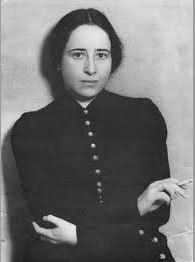
Quirky social history is just my cup of tea. But... but...
The book is about the Jews and, faithful to an age-old Jewish tradition (see Isaiah, Jeremiah, Ezekiel, et. al.) I’m currently down in the dumps about the Jews. When I daily have to psychologically fortify myself against another news headline about Israel, is the pleasure of satisfying my socio-historical curiosity worth the anguish of being continuously reminded of my wayward brethren? No.
So, no to Allegro’s book.
After Allegro, Arendt: three books of hers that I haven’t read among six on the shelf. Why not? Hannah Arendt holds a special place in my heart. (I fell in love with photograph of her when she was eighteen; I see it every day, at the center of my home screen.) If I’m looking for socio-historic cogitation, Arendt is right up my alley. But... but...
I can no longer bear to read late 20th century theoreticians of society and politics—Arendt, Camus, Chomsky, Said, Berlin, etc. They had no idea what was coming. No matter how rational, how objective, how wise their analyses and prognostications seemed when they were written, they have become irrelevant, based as they were on a 3,000-year-old civilization which, alas, lately bought the farm. (The process of its mummification has already begun in the mausoleum known as history.)
Arendt and her fellow social philosophers believed—and why not?—that people would always know the difference between freedom and subjugation, knowledge and ignorance, truth and dishonesty, order and chaos, joy and misery, and always prefer the first to the second. As a member of the elite band of acknowledged Great Thinkers, Arendt assumed that her characterizations of such things as totalitarianism, democracy, the human condition, good and evil, were definitive. As it turns out, all those serious books written in the 20th century about society, politics, human nature, have become only remarks about the way things once were—often interesting, but quite unconnected with the world as it is today. Furthermore, for me, most of whose thinking, although not necessarily great, occurred at the same time as that which informed this once seemingly prescient and perceptive body of literature, reading it now fills me with—not nostalgia, something more painful than that—homesickness, the homesickness of permanent exile, which I certainly could do without.
So. Sorry, Hannah. Not today.
But how about a coffee at Figaro tomorrow?
Next, after reluctantly rejecting Allegro and Arendt as too distressful (after all, I read mainly for pleasure), I pulled out Matthew Arnold’s Essays, one of those nice little Everyman’s Library editions from the ‘50’s.
I had found something to read.
 RSS Feed
RSS Feed